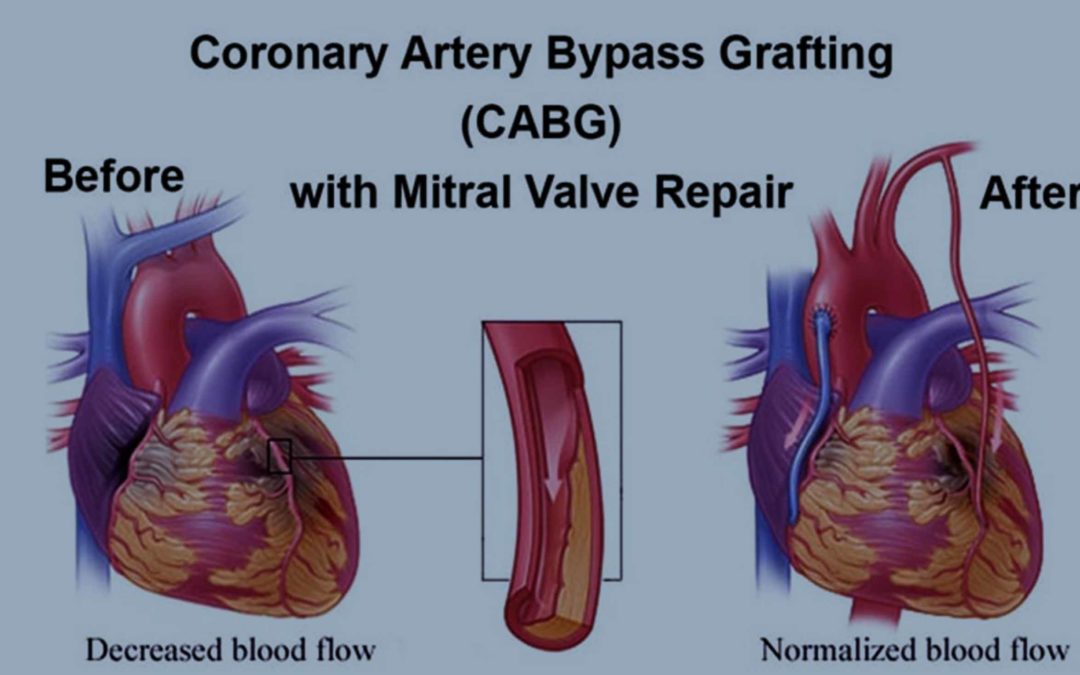What is coronary artery bypass graft surgery? — This is a type of surgery that is used to treat coronary heart disease. The surgery is also known as “bypass surgery” or as “CABG” (pronounced “cabbage”).
In people who have coronary heart disease, the arteries that supply blood to the heart get clogged with fatty deposits.
This can block the flow of blood to parts of the heart muscle.
During bypass surgery, the surgeon uses healthy pieces of blood vessels from other parts of the body (called grafts) to reroute blood. Sometimes the surgeon does this by attaching a graft above and below a blockage, creating a bridge over the blockage. Other times, the surgeon redirects an artery that is supposed to supply the chest muscle and attaches it to the heart. These types of grafts allow blood to get past blockages and to the heart muscle that was not getting enough blood.
In many cases, a doctor can first try something called “angioplasty” to treat coronary heart disease. This involves putting a thin plastic tube into the blocked artery, and using a tiny balloon to open the blockage. Then the doctor leaves a tiny mesh tube called a “stent” inside the artery to hold it open. Bypass surgery is usually recommended for people with coronary heart disease who:
● Continue to have chest pain that does not get better with medicines, and angioplasty with stenting is not possible (or has already failed); OR
● Have blockages that a doctor thinks could lead to heart attack or death
How do I prepare for bypass surgery? — You will get detailed instructions from the hospital on how to prepare for your surgery. In general, you will need to stop eating by midnight the night before the surgery. You might also need to stop taking certain medicines several days before the surgery. Otherwise, you will not need to change much of your routine before the surgery.
What happens during bypass surgery? — Before the surgery you will be given medicines (called anesthesia) to help you relax and then to make you unconscious. That way you will not be aware of what happens during the surgery.
What happens after bypass surgery? — You will spend 1 to 2 days in an intensive care unit (also called an “ICU”). While in the ICU, you will be connected to machines that will monitor your heart, blood pressure, body temperature, and breathing. As you get stronger, you will need fewer and fewer of these machines. You will also have a number of tubes to help you breathe, urinate, and do other normal body functions. These will gradually be removed as you improve. When you are ready to leave the ICU, you will go to a regular hospital room for another few days.
The wound from the surgery will be sore for 2 to 3 days, but you will get pain medicines to deal with that. You will also have some tubes draining fluid from your chest. During the few days after surgery, it is normal to have a poor appetite, be constipated, and have trouble sleeping. Give yourself time to get back to normal.
If you had a graft taken from your leg, you might notice some swelling in that leg after surgery. Elevating the leg and wearing special socks called “compression stockings” can help to reduce swelling.
What problems can happen after bypass surgery? — Most people do extremely well with bypass surgery, but there are a number of problems that can happen. The chances that any of them will affect you will depend on a lot of different factors, so ask your own doctor about the risks for you. In general, the most serious risks of bypass include:
● Major bleeding
● Heart attack
● Heart failure, which is when the heart cannot pump enough blood
● A heartbeat that is too fast or too slow
● Stroke
● Confusion and trouble thinking clearly
● Lung problems
● Wound infection (either in the chest or the body part where the grafts were taken)
● Kidney failure
● Depression
● Death
020 2634 2998 | 020 4862 2074
INFO@MARIANHEART.ORG

